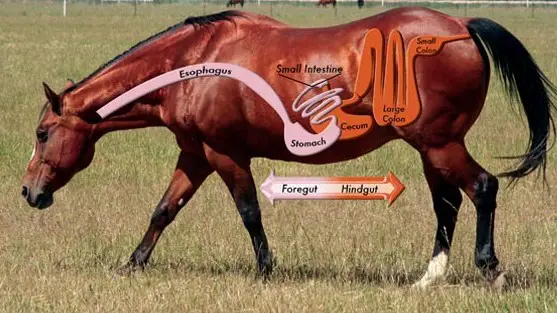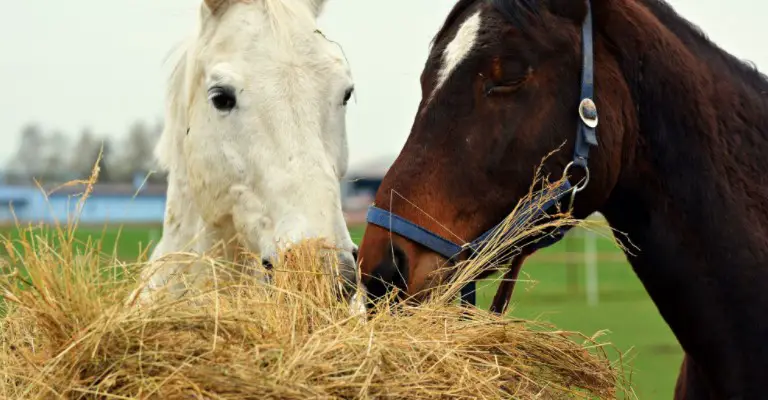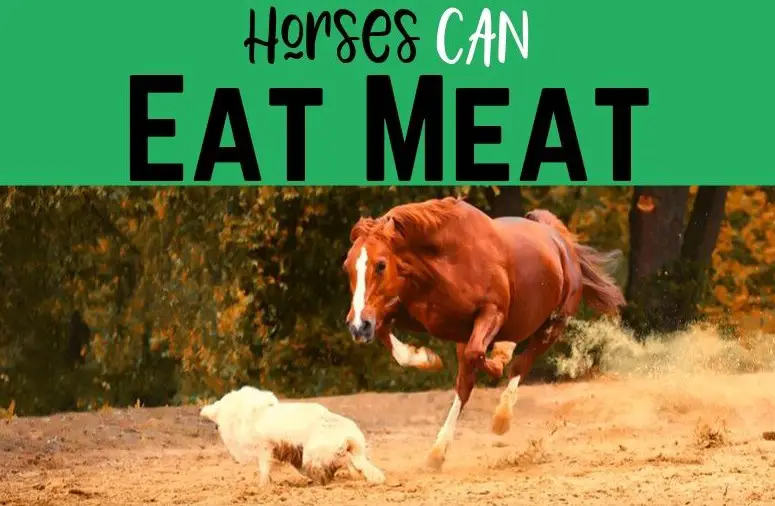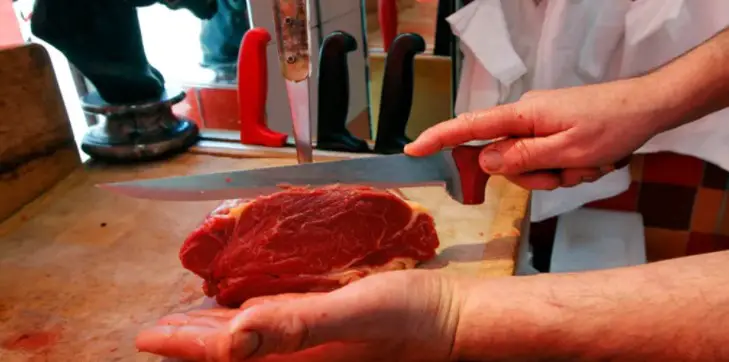Do horses eat meat? Since people have always believed horses mainly ate grass and hay, this question has always been on their minds.
Horses are herbivorous animals by nature, so it raises many questions whenever one comes across any meat-eating horse.
If you’ve read “Deadly Equines,” you know that it’s one of those books that support the claim that horses eat meat. The book reveals the shocking truth about two horses that were fed meat.
Is this typical? Should horses consume meat? Most importantly, is it healthy for them? The simple answer to these questions is NO!
Horses are not meant to eat meat because their digestive system doesn’t support it. However, just like they say, there’s always a black sheep in every flock. This refers to those horses that devour small animals in this case.
However, sometimes fish meal, beef gelatine, bone meal, and blood are usually added to horses’ diets in small quantities when necessary.
Horses’ Digestive System Explained
The horses’ digestive system is a very sensitive system that is biologically designed to digest plant materials. Its gastrointestinal tract comprises the mouth, esophagus, stomach, small intestine, and large intestine.

The Mouth
Like every mouth, that of a horse is no different. It consists of the teeth, tongue, and saliva glands. Digestion begins once food enters the mouth. However, horses have flat teeth, designed for chewing plant materials, not meat. The horse starts by chewing its food into tiny particles. While chewing, the feed mixes with saliva for easy passage through the esophagus to the stomach.
The Stomach
As large as a horse looks, it’s incredible to find out that its stomach size is petite. The stomach consists of 10% of the digestive tract. If you have been to a barn, you’ll see that horses eat all day long. And, as such, they eat little and frequently.
This small stomach is for animals that graze, and horses are in this category. Suppose a horse eats meat that doesn’t sit well with its stomach. This is dangerous since horses cannot vomit. Therefore, keep meat far away from horses.
The function of the stomach is to store and pass the food to the small intestine. The intestines of a horse are large and long. This is because they are herbivorous animals. These types of animals take a longer time to digest plant materials in order to absorb all the nutrients their feed has to offer.
But, this is different in the case of a carnivorous animal. Their system differs. With shorter intestines, they digest meat faster.
The Small Intestine
This intestine contains 30% of the digestive tract. This means that, in the small intestine, 30% of the digestive process goes on here. The food digested goes on to the cecum of the large intestine.
The Large Intestine (Hindgut)
This is where the final digestion takes place. The large intestine comprises the cecum, large colon, small colon, and rectum. The cecum has 12-15% tract capacity, and the colon has about 40-50% tract capacity. In this intestine, foods not digested in the small intestine, such as grains, are finally digested here. The food digestion process here is fermentation which is carried out by bacteria.
Similarly, if a horse should consume meat, it will take all this process to digest the plant. And meat must be digested quickly to be expelled out of the body quickly. Therefore, horses should not consume meat. In addition, horse livers lack the capability of removing toxins from the body.
Horses’ Dietary Needs
Horses need water, fats, protein, carbohydrates, minerals, and vitamins to survive and maintain a healthy digestive system.
When planning a horse feeding program, you must consider its digestible energy requirement, weight management, meeting the horse’s nutrients need, and healthy digestive system maintenance.

When feeding a horse, the quantity of each nutrient you give to a particular horse will depend on its weight and growth.
Water
Water is a vital nutrient for horses. You should always provide fresh water for horses in order to prevent dehydration, colic, or death. In general, the amount of water a horse consumes depends on its diet and physiologic state. For instance, a horse eating hay will drink more water than a horse at pasture. Also, a lactating horse will require more water compared to an average horse.
Protein
As a horse owner, be aware of the quantity and quality of the protein you feed your horse. When we say ‘quality,’ we mean the feed that contains amino acids that aren’t present in the body, like lysine. Examples of suitable proteins are seed meals (soybean or flaxseed meal) and legumes (alfalfa, clover, etc.) Proteins in horses build up tissues, enzymes, muscles, and hormones.
Carbohydrates and Fats
These nutrients are what provide energy for the horse. Also, other carbohydrates and fats provide extra functions, such as keeping the digestive tract healthy. one example of this essential nutrient is fiber.
Minerals
Horses require high amounts of calcium, phosphorus, sodium, potassium, sulfur, chloride, and magnesium.
Minerals such as cobalt, copper, zinc, selenium, iron, and iodine are required in tiny quantities.
Therefore, before you feed your horse, have their feeds analyzed to know the quantities of minerals present. This will help horse owners know when and what amount of lacking minerals is needed. To align to the needs of the horse it’s intended for.
Vitamins
Vitamins are classified into two groups, namely, water-soluble vitamins and fat-soluble vitamins. The water-soluble vitamins include A, D, E, and K, while the other provides vitamin B-complex vitamins such as thiamin, etc. Each horse is unique to its vitamin requirements. Some horses can synthesize some of their vitamins and therefore do not need those in their diet.
Dangers of Meat-eating Horse’s
Meat is hazardous to horses. They might sometimes chow down on your pepperoni pizza, hotdog, etc. but, do not encourage them to continue eating that. And most significantly, they should not eat meat.

Because horses are naturally omnivorous, you should not think that they need meat to survive. This is because meat produces toxins when it goes bad, which triggers dangerous health issues. Therefore, when horses ingest meat, it will take a long time to digest. During this digestion period, the meat might go bad, producing toxins that harm the horse’s health.
Sometimes, a horse’s food (hay) gets contaminated with animal remains unknowingly. This causes botulism in horses, leading to their death if there is no proper medical intervention.
Meat-Eating Horse’s
There are unusual cases where specific horses eat meat and get away with it without harming their digestive system.

Long ago, we discovered that Siberian horses survived barren and freezing conditions with meat incorporated into their diets.
Icelandic horses are another type of horse taught to feed on salted, dried fish throughout the winter for extra protein.
Tibetan horses are also fed with a mixture of blood and grain.
Therefore, Should You Give Your Horse Meat?
The short answer to this is still no! NEVER!
You shouldn’t experiment with your horse’s diet since it’s simple to unbalance a horse’s digestive system.
Even though some horses might eat meat and have no issue, it doesn’t guarantee that all horses will be that lucky. Therefore, feed your horse with only quality forage that is mold-free and toxic-free.
FAQS
1. What is the right food for horses to eat?
The right food for horses to eat is grass, haylage, fruits, vegetables, concentrates, and salts.
2. What is the wrong food for horses to eat?
Do not feed your horse meat as a substitute for pasture during the winter. Also, do not feed your horse many fruit snacks/treats, stone fruits, sugary foods (chocolate), moldy or dusty hay, etc.
3. Should I wet my horses’ feed?
Do not wet your horses’ feed because it can harm their digestive system. What we all want is a feed that promotes a healthy digestive system.
4. Should I add salt to my horses’ feed?
We add salt to our horses’ feed to ensure that their sodium levels are met. They require about 1-2 ounces of salt daily. This dosage can increase to 4-6 ounces daily during hot climates. Therefore, yes! You can add salt to their feed if they lack salt.
5. Will horses eat cattle feed?
No. This is because cattle feed contains ionophores that are extremely dangerous for horses.
Final thoughts
Overall, horses’ digestive systems are delicate and are only suited for plant materials, not meat. This does not mean that horses can’t eat meat. Obviously, if you give them meat, they will eat it because horses don’t know it is harmful.
Therefore, the weight falls on us to ensure our horses get the proper diet in their right proportion for the right nutrients.
